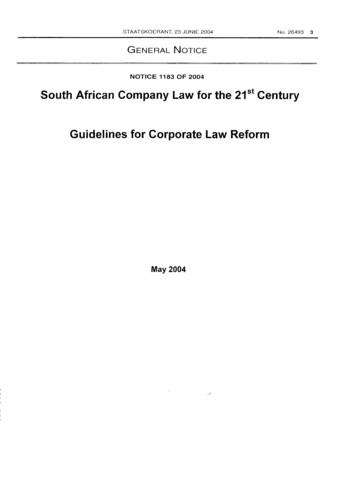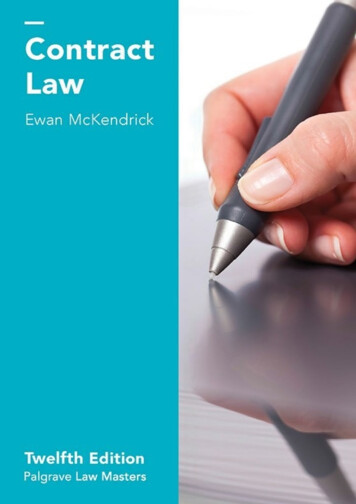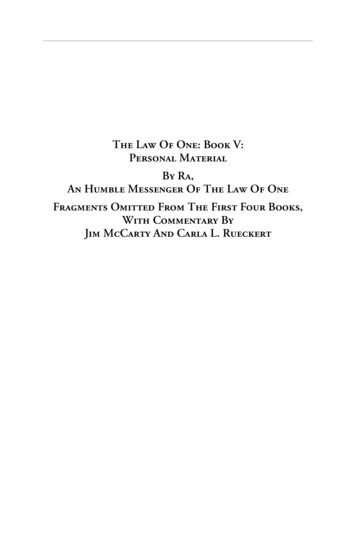
Transcription
STAATSKOERANT, 23 JUNlE 2004No. 26493GENERALNOTICENOTICE 11 83 OF 2004South African Company Law for the2IS*CenturyGuidelines for Corporate Law ReformMay 20043
4No. 26493 -GOVERNMENT GAZETTE,23 J U N E 2004CONFIDENTIALThe dtiwishestoexpressits appreciationtoall South African andinternational experts who have contributed to the formulation of this policydocument. In particular, the dti wishes to acknowledge the late ProfessorMichael Blackman for sharing his extensive knowledge and expertise andfor his valuable contributionsto this process.2
STAATSKOERANT, 23 JUNIE 2004No. 26493CONFIDENTIALForeword by Mandisi Mpahlwa, Minister of Trade and IndustryIn the last ten years our economy and its legislative framework have undergone a massiveprogramme of reform. Many feel that we have had almost too much change. However, thisreformhasbeenfundamentalto our future and is driven bothbyournewdemocraticdispensation and the pace of change in the global economy. The further reform processproposed in this policy paper is indeed somewhat overdue.Company law provides the legal basis for one of the most important institutions organisingand galvanising the economy,namely,corporatebusinessentities. Corporations, invarious forms, are central to a country's economy and its prosperity - for wealth creationand social renewal. The decision of the Department of Trade and Industry in South Africa(the dti) to review and modernise company law in this country was based on the need tobring our law in line with international trends and to reflect and accommodate the changingenvironment for business, both in South Africa and globally.The current framework of South African company law is built on foundations, which wereput in place in Victorian England in themiddleofthe nineteenth century.Sincetheintroduction of the 1926CompaniesActtherehasbeenonlyonecompany law, whichwas initiated in 1963andculminatedsignificant reviewofin theCompanies Act, 1973.Although a major review of company law in South Africa, the 1973 Act is still based on theframeworkandgeneralwhichourcompanyprinciples of theEnglish law. Significantly, the frameworkuponlegislation is based has beenquestioned in the land of its origin,England, where the review of corecompanylawresulted in the publication of the finalreport of the Company Law ReviewSteering Group in July 2002.Thisreviewofcompanylawin South Africa is ty. South Africa haslast review of its companylaw.Anewpolitical, social and econonjc urther underscored the needforconstitutionalbeen established postlegislative developmentssince the 1990shavereform. In addition the South African and globaleconomies are significantlyaltered in their functioning.35
6No. 26493GOVERNMENT GAZETTE, 23 JUNE 2004CONFIDENTIALThis policy paper sets out the basic approach that we intend taking in the reform and setsthe hatwe have company law,which is up-to-date, competitive and designed for a modern corporation that is not only adomestic institution operating in a new environment but also an international competitor.We also have to take into account that these days many companies are global and operatein many economies and jurisdictions,not only that of South Africa.We are presented with an important opportunity to carry out path breaking changes in ourcommercial environment thatwill benefit our economy and citizens.Mandisi Mpahlwa, MPMinister of Trade and Industry4
STAATSKOERANT, 23 JUNlE 2004No. 26493CONFIDENTIALITable of ContentsCHAPTER I:COMPANY LAW FOR THE 2ISTCENTURY1.1Introduction1.2TheobjectivesP. 7of newcompanylaw1.3Thescope of thereview1.4ConclusionP. 8P. 9p. 11CHAPTER 2: THE HISTORY OF COMPANY LAW AND THE NEED FOR REFORM2.1forneed 2.2The evolution of company law in SouthAfricap. 12Thep. hep. 13A new constitutional dispensationp. 14p. 152.2.32.2.42.3AThetreatmentof non-profitandotherorganisationsp. 18p. 18ConclusionCHAPTER 3: THE GENERAL PRINCIPLES OF NEW COMPANY LAW3.1Introductionp. 193.2Thescope of companylawp. 19p. 193.2.1Introduction3.2.2Ahistoryp. 20of the p. bilityandtransparencyp. 27p. 283.5Harmonisationwithothercompanylawsp. 283.6Conclusionp, 29legal framework57
8No. 26493GOVERNMENT GAZETTE, 23 JUNE 2004CONFIDEZNTIALCHAPTER 4: GUIDELINES FOR NEW COMPANY LAW4.1Introductionp. 304.2Company formationp, 304.3Corporate financep. 324.3.1Sharesandshareissuancep. 324.3.2Capitalmaintenancep. 334.4Corporate governancep. 354.4.1p. 35Shareholderandinvestorprotectionof rep. 37and reportingp. 394.5Mergers and takeoversp. 404.6Insolvency and corporate rescuep. 41p. 424.6.1Windingupand insolvency4.6.2Corporaterescueand4.74.8judicial managementp. 42p. 43Administration and enforcement4.7.1A newCompaniesandIntellectualProperty4.7.2The CompaniesTribunalCommissionp. 44p. 474.7.3Disputeresolutionp. 484.7.4Companylawreviewsp. 48Conclusionp. 48FORWARDCHAPTERWAY 5: THEp. 496
STAATSKOERANT, 23 JUNIE! 2004No. 26493CONFIDENTIALChapter 1Company law1 for the 21’‘ century1.IIntroductionIn November1997, the dti , whichoutlines a broad legislative reform programme that included a review of existing securitiesregulations; institutions with principal oversight of corporatestructure;andcurrentpractices and regulations in the area of corporate governance.Since the publication of the Competition Policy in 1997, a number of events have had animpact on company law. For example, a Securities Services Bill and a Financial ReportingBill have been prepared, and the second King Report on Corporate Governance has beenpublished.However,nocomprehensivereformof companylawhastakenplacesinceinvestigation of st, over the past ten years, anumberin 1963. Byof countries have. undertakenextensivereviews of their domestic company law.‘ During the samecorporate failures havefocusedtheperiod, a series of spectacularattention upon the need for improvedcorporategovernance in many countries, not the least being the IJSA, which has recently passedtheSarbanes-Oxley Act.This policy papersetsouttheframeworkandguidelinesfor more detailed technicalconsultation, which will provide the foundation for the drafting of a new Companies Act.Although the intention is to engage in a comprehensive reviewof company law, it is not theaimofthe dti simply to writeanewActbyunreasonablyjurisprudence built up over more than a century. The33jettisoning thebodyofobjective of the review is to ensurethat the new legislation is appropriate to thk legal, economic and social context of SouthAfrica as a constitutional democracyandanopeneconomy.Wherecurrent lawmeetsthese objectives, it should remain as part of company law.79
10N o . 26493GOVERNMENT GAZETTE!, 23 JUNE 2004CONFIDENTIALFor these reasons, this document intends to makethe case for reform, set out a clearpurpose and scope for company law for South Africa in the 21'' century and then applythat defined purpose and scopeto identify and (describe the principal areas of companylaw to which careful considreration will be given. The objectives set outin this documentwill be subjected topublic scrutiny.1.2The objectives of new company lawThe review of this area of law should be undertaken with the understanding of the role ofcompany law in the 21'' century and its role in the economy as a whole. The Government'svision for the South African economy is captured in the Integrated Manufacturing Strategy(IMS) of the dti. The introduction of the IMS states that: needsof all oureconomic citizens - our people and their enterprises. This means access to qualitywork and enterprise opportunities, and access to the capacities and skills to makeuse of these opportunities. Enterprises of all types and sizes will have to becomeadaptive, innovative and internationally competitive.' (p2 )In realizing this vision, a key role for government isto ensure that the regulatory frameworkwithin which enterprises operate promotes growth, employment, innovation, stability,governance,confidenceandinternational competitiveness.Regulationshouldconsistent, effective, ibility andpromoteadaptabilitytoanenvironmentgoodbeIt shouldprovidewith fast changing technologies,economic opportunities and social circumstances.Theregulatoryschemeshouldcreate artificial preferences and distortions, where these are unnecessary. Andnotit shouldattempt, where practically possible, to balance the competing interests of economic actorsand of society at large.The regulatory policy also needstorecognisetheuniqueSouthAfrican contextandpromote equity in a manner consistent with the South African constitution. As reflected inthe recent 'Towards A Ten Year Review,' performed by the g vernment, South Africa hasmade significant strides over the past nine years of democratic governmentin terms ofdevelopment - socially, politically and economically. However, the Review4 concludesthat8
No. 26493STAATSKOERANT, 23 JUNIE 2004CONFIDENTIAL“two economies” appear to persist in this country. “The first is an advanced, sophisticatedskilled labour, which is becomingmoregloballyeconomy,basedonsecond is mainlya informal,competitive. Themarginalised, unskilled economy,populatedunemployed and those unemployableby thein the formal sector. Despite the impressive gainsmade in the first economy, the benefits of growth have yet to reach the second economy,and with the enormity of thechallengesarisingfromthe socialtransition,the secondeconomy risks falling further behind if there is no decisive government interventi n: Taking into account the vision of the economy and the particular challenges that SouthAfrica faces,webelieve that pment of the South African economy by: 1. Encouraging entrepreneurship and enterprise diversity by simplifying the formationof ainingwith the formalities of formingaits existence, thereby contributing tothecreation ofemployment opportunities;2. Promoting innovation and investment in South African markets and companies byprovidinga predictable and effective regulatoryenvironmentandflexibility in theformation and the management of companies;3. Promoting the efficiency of companies and their management;transparencyand4. Encouraginghigh standardsof corporategovernance,recognising the broader social role of enterprises;compatibilityandharmonisation5. Ensuringwithbest practice jurisdictionsinternationally.1.3The scope of thereviewThe reform of South African Company law will involve an overall review of company law,that is the Companies Act, 1973, the Close Corporationsbet, 1984, and the common lawrelating to these corporate entities. The review will not include partnership law.In general terms, the task of the review will be to develop a legal framework, based on theprinciples reflected in the Companies Act, the Close Corporatians Act, and the common911
12No. 26493GOVERNMENTGAZETTE,23 JUNE 2004CONFIDENTIALor maintenance, and death oflaw, which cover the requirements for the birth, existencecompanies. The reviewwill identify the fundamental rules governing the procedures overnance,mergersandacquisitions, the cessatiopoftheexistenceolf a companyandtheadministrationandenforcement of the law. The review will also consider the relationship between companylaw andotherrulesof shareholders,and state,theenvironment, the consumers, the suppliers and Black Economic Empowerment initiatives(BEE).In so far as administration and enforcement are concerned,one issue for the review willbethebalancebetween civil, administrative and criminalsanctions.Thisis importantconsidering that the existing Companies Act too readily invokes criminal penalties,whencivil or nowledgethattheenforcement mechanisms edbetween the dti and a variety of nge SA (JSE), the Financial Services Board and the Director of Public Prosecutions.It is intended that the review will address the institutional requirements to ensure simplicityand effective and consistent enforcement and to clarify rolesand responsibilities.The review will extend to the law relating to the non-profit organisations and co-operatives.Many non-profit organisations are incorporated under section21 of the Companies Actand the implications of changes for these charitable companies cannot be overlooked. panyLawandCo-operativeslegislation, as far asco-operativesas commercialentitiesareconcerned,consideration. It thesamerules regardingformation,governancewill requireas commercial entities, areand capitalisationascompanies, so that members tion in their dealings with co-operatives and so that no legal loopholes are createdfor the circumventionof basic company law principles.As this review is initiated, investor confidence around the world, and particularlyin the US,hasbeenbadlyshakenby rmalat, to name but a few. Indeed, the actions ofa small number of people have had10
STAATSKOERANT, 23 JUNIEE 2004No. 26493CONFIDENTIALimmense repercussions on the whole business community. Furthermore, the accountancyand auditing professionshavebeenbadlyreflected asagovernmenthasresolvedtomakeimprovementsresult of those events. Theto accountingstandardsandtheregulatory framework for accountants to ensure the pro'motion of the continued integrity offinancialmarkets.The NationalTreasuryProfessions Bill to addresstheseissues.Whileis currently exploring anewAccountingthe need for the legal backing ofaccounting, and possibly auditing, standards has been clearly determined, debates are stillongoing about the best mechanism to achievethis objective. The National Treasury andthe dti will be working closely together to ensure that Icompany law and the regulation ofthe accounting profession is complementary.As is clear from the above, an extensive review of current company law is desirable, timelyandnecessary. This reviewwouldbebroadlybusiness of unnecessaryreformsconsultative to allay fears on the part ofthat may create uncertainty. Careful considerationshould be given to developments and best practice internationally and the possibilities fortheir adaptation to the South African context, particularly in the light of the legal frameworkbrought aboutby the Constitution.1.4ConclusionTheoverridingissueforany market-basedeconomyis vibrant capital formationanddeployment. It has aptly been said that company law is, to business as the shell is to theoyster: It is whatgoesoninside that countsmost.Goodcompanylawcancreateaprotective and fertile environment for economic activity but it cannot, by itself, create thatactivity. Economic citizens in creating such activity respond to a wide range of incentivesand disincentives, oneofwhichis a clear, facilitating, predictable and consistently'enforced governing law. The development of such a lawis the purpose of this review.333313
14GOVERNMENT GAZE'TTE, 23 JUNE 2004No. 26493 CONFIDEtNTIAL2.1The evolution of Company law in South AfricaCompanylawhasexistedinSouth s Limited LiabilitiesAct No 23 of 1861 of theCape Colony, which, along withother provincial company legislation, was a carbon copy of equivalent English legislation.Thefirstnational company law was introducedin 1926 with the Union Companies Act,which was amended from time to time along the lines of the latest English legislation. The1926 Act was replacedin 1973 with the Companies ActeffortstoinnovateanddevelopNo 61 of 1973, which, despitea direction more appropriateforSouthAfrica,remainsmuch in the mould of English law.The current framework of company lawin South Africa is therefore essentially built onfoundations, which were put in place by the British in the middle of the lgth century.6 The1973Act,hailed as glishcompany law, however, adopted many of the principles and provisions of the 1926 Act. Itis therefore still based on the framework and general principlesof the English laws7Mostamendments to the Companies Act, with the exception of the establishment in 1989 of theSecurities Regulation Panel to regulate takeovers and changes of controlin a company,have been of a technical nature. Thus, the last extensive reform of company law occurredin South Africa in 1973 with the enactment of the existing company law, and even thenthemodel remained thatof the 1926 dKingdomoccurredwiththeadoption in 1984 of the Close Corporations Act, No 69 of 1984. The new law was troductionofa newformofincorporation for small companies,, which, ironically, was never implemented in the UnitedKingdom. The purpose of the Close Corporations, Act was to providea simple, inexpensivebusiness entity offering limited liability for a single person enterprise or one involvingasmall number of persons, which has been largely successful, as is witnessed by the large12
STAATSKOERANT, 23 JUNIEI 2004No. 26493CONFIDENTIALnumber of closecorporationsthat areregisteredwith theCompaniesandIntellectualProperty Registration Office (CIPRO).2.2Theneed forreform2.2.1 A changing environmentInternationally, company law review is a continuous process that ensures that the laws arereflective of market practices and societal needs. The !South African Companies Act, 1973,is 30yearsoldandhasnot beensubjectedtoacomprehensivereviewto reflect thefundamental developments that have taken placein South Africa and elsewhere.Thedomesticandglobal environmentforenterprises haschangedmarkedlysince1970s.Corporatestructures elopments. Many old concepts have been abandonedtheor modified and new conceptshave been developed. We now live in a world of greater globalisation, increased electroniccommunication, greater sensitivity to social and ethical concerns, fast changing markets,greater competition for capital, goods and services. SouthAfrica cannot afford to be leftbehind. There is agrowing recognition by companiesandgovernmentsneed forhigherstandardsofcorporategovernanceandthat there is aethics andgreaterinterdependence between enterprises and the societies in which they operate. A numberof corporate failures in South Africa and other jurisdict:ions have revealed serious defectsin the prevailing standard of corporate governance and theadministration of the law andhave resulted in investors suffering extensive losses.Sscio-political and economic change in South Africa has underscored the need for ofenterprises. The mobility ofinternational capital has highlighted the need for domestic laws to be investor friendly andcompetitive with international trends. The rise in international trade and foreign investmentrsince 1994 has made necessary the harmonisation and modernisation of company law, aswell as the need to makespecific provision for foreign companiestooperatein SouthAfrica. This is further underscored by South Africa’s reintegration into the region and therole that the countryanddomesticcompaniesplay in the ,economicdevelopmentof1315
16No. 26493GOVERNMENT GAZETTE. 23 JUNE 2004Southern Africa and Africa in general. Finally, the growth of the small business sector hascreated a need for simpler and more accessible esin theenvironmentin whichbusiness operates and the consequential need fora comprehensive company law review.2.2.2 A new constitutional dispensationSincetheCompaniesActwasenactedtaken place in SouthAfrica.Thein 1973, fundamentallegaldevelopmentshavemost importantchangewastheadoptionoftheConstitution in 1996.' No area of South African law can be analysed or evaluated withoutrecourse to the Constitution, whichis the supreme law of the country. The Bill of Rights, asprovided for in Chapter 2 of the Constitution, constitutes a cornerstone of democracy inSouth Africa. It enshrines the rights of all people in the country and affirms the democraticvalues of human dignity, equality and freedom.It also regulates the relationship betweeneconomic citizens and thusmay have fundamental implicationsfor company law.Since 1994, government hasset out to dismantle apartheid social relations and createdemocratic society based onequity, equality, non-racialism and non-sexism,theConstitutionandthe ReconstructionandDevelopmentprinciples of the Constitution areain line withProgramme (RDP).Thereflected in the policies that informed legislative reformprocesses since 1994. Legislative and other measures, which reflect these constitutionalprinciples, include the attempt to balance the interests of employees and employers and toenhance equity in employment, as capturedin labour legislation, particularly the LabourRelationsAct of 1995,the Employment EquityActgandthe SkillsDevelopmentAct.1 998,environmentalregulation,"as well aspromotion of access to information by stakeholders, particularly in a corporate setting.13New company law should therefore be consistentnot only with the Constitution of SouthAfrica and the principles of equality and fairness that it enshrines, but also with other lawsthat have been enacted, including theBEE Act, competition law, environmental law andaccess to information legislation.14
STAATSKOERANT, 23 JUNlE 2004No. 26493CCNFIDENTIAL2.2.3 The need for modernisationPerhaps the most convincing case for a holistic review of company law can be made onthe basis of the existing law itself. For example, one of the major difficulties with the SouthAfrican company law regime is that it is highly formalistic, making it burdensome and costlyto form and managean enterprise and creating artificial preferences for certain structures.Both the Companies Act and the Close Corporations Act require a large number of stepsto form and register a business, including, amongst others, the completion of numerousforms, compulsorynamereservation and the requirement that all members sign thefoundingstatementsormemorandumandarticles of association. Anumberofthestatutory requirements add unnecessary formalities to relatively simple processes and maybe ofquestionablevalue,astheydonot result in greater protection for shareholders,transparency in the market or enhanced efficiency of enterprises. In fact, they may providedisincentives for registration andencourageshamcompliancethus a need to systematically review the requirements andwith provisions. There isto identify the truly necessaryones, adding more flexibility and ease o f compliance without compromising transparencyand recourse.Furthermore, the fact that the Companies Act is highly creditor-oriented leads to thecollection of large amounts of information and the lodgement of manyformsCompanyandIntellectual PropertyOffice(CIPRO).Muchwith theof this information is ofquestionable utility to the commercial and investment communities. In addition, the largenumber of lodgements at CIPRO currently results in delays in processingandavailability of lodged documents, despite gains made throughin thethe recent introduction ofelectronic lodgement. As a result, South Africans in thebusinessandfinancialcommunities do not rely on the information filed at CIPR0.'43333The current company law regime introducesJhree business vehicles, a public company, a2private companyandaclosecorporation.Relativelyprivate andalittle distinction is madebetweenapublic company in the current law in terms of structure and reportingrequirements, while the gap between these two business vehicles and a close corporationis large. While a close corporation offers a viable alternative for smaller businesses, whichhave no need for the more onerous reporting requirements, the Close Corporations1517
18No. 26493GOVERNMENT GAZETTE. 23 J U N E 2004CONFIDEN-TIALis still highly formalistic in nature, making it difficult for unsophisticated entrepreneurs tocommence business and ensure its effective management, The requirementin the CloseCorporations Act scertaincategories of equity financiers from investingin these business entities. The scope andbreadth of liability forcorporatedebtcurrentlyin theActmay easilyexposeunsophisticated investors to persorial liability. There is thus a need to review the currentbusiness forms available for the registrationof enterprises with a view to providing the bestform of incorporation, especially for people forminga business for thefirst time,The rules relatingtocapitalrequirereview.of parThe thi,nSouthAfricaandhasbeenabolishedin otherjurisdictions. Par value was originally developed in the early days of companies to ensure“equitable contribution,’’ Le., equal pro rata payment by shareholders for shares issued bythe corporation. The par value may have been intended to representsome sort of measureof value. This purpose was long ago abandoned as economicallyand its sharesoutstanding),wereemployedunrealistic. Par valueby the totalnumberofas part ofanequationdeterminingwhetherthecorporation could pay dividends or make other distributions toits shareholders.16 Underthis equation, a corporation may not;pay a dividend or make another distribution unless thesum of its assets at least equals the sum of its liabilities and its stated capital. To put it inotherwords,a corporationcouldmakedistributionsonlyoutof ”surplus.” With thedevelopment of low-par and no-par share, this reason for par value has also fallen away.Today, it is widely recognised that par valueis economically insignificant and artificial.The other main purpose that par value servesis of course that shares cannot be issued ata discount to par. It thus provides a floor but no ceiling to the issue price. Historically thatwas seen as some degree of protection to existing shareholders. The par value formedpart of the concept of capital maintenance which now is superseded bymore sophisticatedconcepts. Theidea,putsimply,wasthatthe price of limited liability was thattheshareholders’ capital hadtorankbehindthe creditorsandthereforecouldwithdrawn.Thenot bemain dequatecreditor protection can be obtained without the rigidity that this system requires, provided,of course, that other areas of law, such as insolvency Law and Tax Law, are oaderregulatoryframework.Thereis16
STAATSKOEiRANT, 23 JUNII? 2004No. 26493CON Fl DENTIALtherefore a need to review these rules andto provide rnore flexibility for companies to raisecapital in a global environment that requires responsiveness and innovation.Current company law also does notcontain clear rules regarding corporate governanceand the duties and liabilities of directors;. These matters have been largely left to commonlawandCodesof CorporatePractice.Thus,covering the duties andobligationsthere is noextensiveof directors andtheirstatutory schemeaccountability in casesofviolations. It will be an important part of the review of company law to ensure that directorsare made as accountable to shareholders as is practicable. An important aspect of this isthe ability for irectors. Thereviewwill examine votingto the free use of shareholdersvotestoappoint,remove and replace directors. In addition, significant emphasis will be placed on the needfor disclosure and access to information.Perhaps the most significant deficiency in the current law is that it doesnotprovideeffective mechanismsforpresent law. Thethe enforcement of eventhoseduties prescribedundertheresult is that the directors and senior management of large companiesare effectively immunefromlegalcontrol, exceptperhapsin regardtothemoreoutrageous criminal offences. The lack of enforcement and recourse is in part attributableto the disincentives to litigation created by the court system, such as the under developednature of class actions and contingency fees andthe costs of protracted litigation, whichcollectively diminish the practical effectiveness of the civil and criminal sanctionsandremedies contained in the law. A further significant weakness is the absence of a publicinstitution with e powerstoinvestigate andenforcethe rights ofWhile the Minister of TradeandIndustry isempowered in the current law to appoint inspectors and to institute civil litigation on cedandreactive, based largely onshareholder complaints. The increasing ,Fragmentation of enforcement responsibility opens3up the possibility of unequalregulati'on,andregulatoryr,arbitrage between differentenforcement agencies.These factors should be reviewed extensively with a view to balancing access to companyinformation to promote greater shareholder activism, the enforcement of rights andtheavoidance of excessive or frivolous litigation.1719
20No. 26493GOVERNMENT GAZETTE, 23 JUN
environment for business, both in South Africa and globally. The current framework of South African company law is built on foundations, which were put in place in Victorian England in the middle of the nineteenth century. Since the introduction of the 1926 Companies Act there has been only one significant review of










